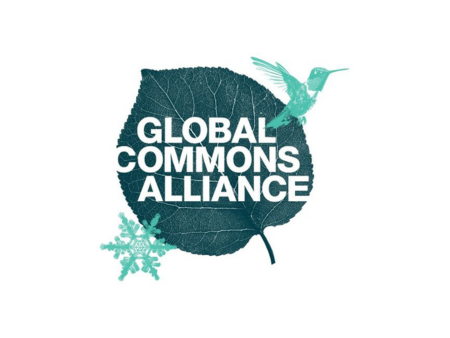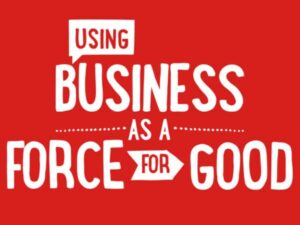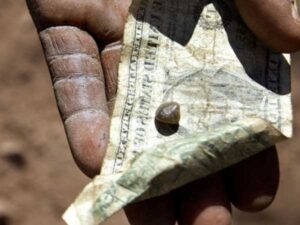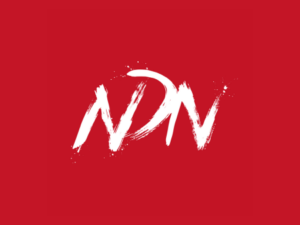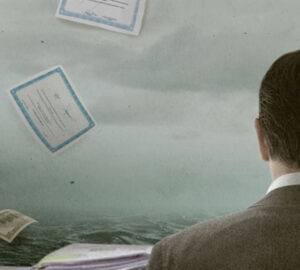The Global Commons Alliance is a growing coalition of scientists, philanthropists, civil society groups, businesses and innovators, enabling collective action to safeguard the global commons.
Tim Kelly of Global Commons Alliance spoke with Alec Saelens on May 8, 2024. Click here to read the full conversation with insights highlighted.
Alec Saelens: To begin with, I would like you to introduce yourself and the work of your organization, the Global Commons Alliance.
Tim Kelly: I’m running an entity called Earth HQ, which is the media arm of the Global Commons Alliance. The Global Commons Alliance was formed about five years ago by a group that included Naoko Ishii from the Global Environment Facility, Johan Rockström from Potsdam Institute for Climate Impact Research, and a larger group of NGOs like WWF, the Nature Conservancy, Conservation International, and the World Economic Forum, all of whom were interested in collaborating on systems change.
The Global Commons Alliance encompasses a number of mechanisms to try to drive systems change, starting at the planetary health level with the Earth Commission, tracking the state of the planet. At the economic level there is the Systems Change Lab, supported by the World Resources Institute and Bezos Earth Fund, tracking the economic transitions that are needed. At the company and cities level there is the Science Based Target Network and Science Based Target Initiative, which help companies move to set targets for both climate and biodiversity. The Accountability Lab tracks accountability and transparency for all of those things. And finally, the idea of building public engagement and support and public demand for change–that’s where Earth HQ comes in. That’s the piece that I’m involved with.
My background is 30 years of running National Geographic Media. I was head of all their television, film, and digital, and I was president of the society for my last few years there. I spent a lot of time trying to inspire people to care about the planet. My big concern right now is that the global information network is broken. Most vital science and good journalism are behind paywalls and only available to a tiny portion of people. People can’t afford to pay for it. So most people get their information through social media platforms. Social media platforms are by design set up to hype the anger and outrage. They make money off of spreading disinformation.
I’m just coming back from the Skoll World Forum, where there were comments about this being the nuclear age of misinformation. We’re at a moment when we need a lot of political will to make large-scale changes, but that will doesn’t exist because the public is confused, and they don’t have access to great information. It’s a fundamental problem that affects not only the environmental crisis but also mental health and democracy itself.
We’ve been very focused on trying to reach people through Creative Commons communicators. On the journalism side, we supported the millennial news service NowThis in building NowThis Earth, a channel of reporting across all social media platforms using short form video on the state of the planet with many voices from the Global South, many perspectives on solutions, people taking action, trying to build some hope.
We’ve been supported by the Skoll Foundation on investigative-reporting work. And for almost two years now we’ve had a partnership with Mongabay, doing investigative reporting on ecosystem destruction, particularly the role that indigenous people and local communities play in the conservation of forests. We’ve done 50 or 60 stories and counting on a platform that is available in six languages with editorial bureaus in places like India, Indonesia, Brazil, Africa. So we’re supporting reporters on the ground in these countries, on the front lines, reporting solid environmental science for an audience of policymakers and media. It’s Creative Commons, so it can be picked up by any news organization.
What we’re working on now is a larger-scale initiative called EPIC: Earth Public Information Collaborative. It’s an effort to bridge the gap between the scientific community and the creative community. So we’re working with advertising agencies, tech platforms, media companies and creatives to build a bridge, with the goal of moving a billion people off the sidelines and into active engagement in the planetary crisis. We’re developing this as a big collaboration in the media and communication space. We’re finding a ton of support and enthusiasm for it. The deliverables from this will be global and regional campaigns, as well as original content in all genres, from TV series to telenovelas to short-form video journalism.
The third outcome is convenings. For instance, we’re going to be presenting at Cannes Lions, the big gathering of the trillion-dollar-a-year advertising industry in June. We’re actively trying to bring in the world’s largest advertising agencies, corporate brands, and foundations to support a new public-service initiative to create a global media ecosystem that is accessible to most people and gives them a true picture of what’s happening not only to the planet but to their community, and what their options are to get involved. Because we feel that public engagement is the big blocker right now in achieving large-scale change. The science is pretty clear, and a lot of the solutions are pretty clear, but there’s been a blizzard of misinformation and confusion that has been the number-one blocker in terms of getting big things done.
Alec Saelens: Could you illustrate the work that you’re doing by describing the ways that it has affected certain communities? Or can you point to certain beneficiaries that have seized on the work that you’re doing to run campaigns, to become more aware and involved in trying to stem the tide of destruction of planetary ecosystems?
Tim Kelly: There are a number of examples. For instance, in December, we published an investigation in Mongabay revealing that in Brazil, more than half the land registered in the northern Pará state by a big company, Agropalma–the only Brazilian company with sustainability certificate issued by the Roundtable on Sustainable Palm Oil–was derived from fraudulent land titles and even the creation of a fake land-registration bureau. So we came out with this investigative report and the government is now taking action and revoking their certification. I think in some ways investigative reporting is often the easiest way to demonstrate change, because once you shine a spotlight on these things, either the government or the investors or the banks take notice.
Alec Saelens: Could you describe how you measure the success of your campaigns? You said you wanted to activate one billion people. What are the metrics that you’ll be using to assess the success of your work?
Tim Kelly: That’s a five-year goal. We’ll be using public opinion surveys, for one. We’re doing one now, and we’ll try to do one every year across countries. We’ll be measuring region engagement, but it isn’t always possible to measure outcomes. It isn’t always possible to measure actions from the media. So we’ll be using a variety of metrics, not only from media but also from convenings.
I think that arriving at metrics is going to be one of the big challenges for the work we have ahead. That is what the agencies and media companies that we’re going to be working with do. Because on the other side, the companies that are employing campaigns and agencies are of course measuring their results in the form of consumption, or overconsumption in many cases, employing the same social-science and superpowers of these groups to try to get them to make different choices on products, to try to change consumption patterns, to try to build political will for change. That’ll be a more challenging thing to measure.
Alec Saelens: What is distinctive about the approach that you’re taking with the media arm of the Global Commons Alliance? How do you see the distinctiveness of your strategies compared to what other folks might be doing in this sector?
Tim Kelly: I think that to some degree we’ve been playing the wrong game in this sector. We’ve been relying on traditional communication techniques, putting out press releases and white papers and things like that. I think to fully employ the marketing and media communications industry and the creative industry is something that hasn’t been done in a really effective way. I’ll give you one example: the COVID Collaborative is a model that we’re using. It was an effort by the CDC, the Ad Council, and a group of agencies and media companies and brands that came together at the beginning of COVID. They put together about $50 million worth of contributions and media, and it ended up garnering a couple billion dollars worth of media outreach to the public about how families and people can take care of themselves. That was a public service initiative, and it was fairly effective.
That kind of public-service collaboration goes all the way back to World War II. That’s actually when the Ad Council was formed, where agencies and companies and the government came together to move the public to support war bonds, to get women back in the workforce, to grow victory gardens, things that were needed in the time of war. And I think we’re approaching a crisis that is at that level. We need a new public-service initiative. The same thing that was done for COVID needs to be done for this planetary crisis. So it’s a five-year initiative, just to get it to have impact. It’ll be a bill. But we are finding a lot of enthusiasm from big agencies like Horizon, BDX, Intrasong. [We have] been working with Cannes Lion as a partner, and there are young creatives helping us develop pilot ideas. There seems to be a lot of enthusiasm for this.
Alec Saelens: You’ve mentioned some of the challenges. What are you doing to overcome those obstacles?
Tim Kelly: We’ve just begun. We had our first leadership council meeting in New York, hosted by the Rockefeller Foundation, just about six weeks ago. So we’re just pulling the alliance together. I think the challenge is making sure that people understand it’s a collaborative. We’re not trying to build an organization to compete with anybody. We want to work with people who are in this space, like the Potential Energy Coalition, [which is] John Marshall’s group, and Futura and others who are working in this space. We don’t want to reinvent any wheels. We’re trying to put this broader collaborative together so that there is enough scale to actually have some global impact over the next few years.
And one thing we are excited about is [PBScience] in launching this Planetary Boundary Health Check, with Johan Rockström and his team at Potsdam Institute for Climate Impact Research and with the Planetary Guardians team at Virgin Unite. It’s important to be very grounded in the science [while also] being very multifaceted in how we communicate, being able to use social influencer networks, being partners with the tech platforms and the big agencies, and also bringing in the grassroots side of it. So we have folks like Kumi Naidoo, who’s on our leadership council. We want to give the Global South or the global majority a strong voice in EPIC.
Alec Saelens: What you’re pointing to here is how to affect systems-level change. Could you explain a bit further how you think about that?
Tim Kelly: Ultimately we have to change values and beliefs. We have to try to get across why it’s so important to place a value on the environmental systems and life support systems of the planet and how ignoring that has led to massive inequities and massive injustice and will ultimately swamp all of us. So I think we have to reach people culturally and emotionally, and we have to use the best communication science to do that. And that’s why we have to marry voices from the global majority with social science. And we know those skills exist, because a lot of the agencies and media and tech companies we are working with have whole teams that are very specialized in reaching people in Southeast Asia and Africa and India. And we want to work with those best-in-class communicators to give voice to the global majority and to give voice to the science and to point towards pathways of action that people can take.
I’m not for a minute saying we have all the answers here, but I know this needs to be done. There are other groups who are working on pieces of it, and we want to try to pull those groups together and work with them all to try to make this a bigger collaborative, to try to grow the scale of it. So we are setting a big ambition for this. It’s not driven by ego, but it’s driven by the scale that we know change needs to happen and driven by the idea that we know that there are many organizations that are working on pieces of this, and we want to try to help them work in concert as much as possible to try to achieve large-scale change.
Alec Saelens: You talked about making sure that global-majority voices are highlighted based on the work that they’re doing to stem the destruction of an ecosystem’s planetary resources. And you talked about the role of investigative work to point out what the issues are. Do you see a place for solutions-oriented reporting? Is that a piece of the puzzle? Is that something that you seek to get partners and content producers to think about? And do you have strategies around that editorial approach?
Tim Kelly: Absolutely. The work we’re doing, for instance, with NowThis Earth is almost all solutions oriented because that’s what works, that’s what gets people excited and gets them to share and engage in content. And we know that’s critical, especially in the social sphere.
A lot of the work we’re doing with Mongabay is also solutions oriented. We may categorize the whole area as investigative, but a lot of it is about solutions journalism. And they’re also doing a lot of reporting on planetary boundaries science and these transitions that are needed.
I think we’re all critically aware that putting out a steady stream of terrible news, which is often hard to avoid, isn’t a successful strategy. We know the agencies and creatives we’re working with don’t want to be focused on doom and gloom. They want to give people hope and inspiration. So a lot of the work on the campaign side will be hope and inspiration. Journalism is obviously under great pressure right now, and that’s a big area that we feel really needs to be bolstered. A lot of the journalists we work with are looking for those solution stories, but then they also have to be real about what’s happening and also report those things.
So I think it’s a mix. I know what the Solutions Journalism Network does, I know the training you do of journalists, and I think it’s a great thing. It needs to be a bigger part of the reporting and the storytelling, because the news can be very depressing.
I think that that’s one of the things I gained most in working with NowThis. They were relentlessly focused on finding great characters who were out trying to make a difference and telling their story and letting them convey their enthusiasm for what can be done on any level against any problem.
Alec Saelens: From your work at National Geographic and also in your role now, what are the teachable lessons that other people in this space would do well to take from your experience in order to effect systems-level change? What is the advice that you would give to people?
Tim Kelly: I think storytelling is an art and needs to be applied in this space. Visual storytelling is often very effective and inspiring people is really important. Getting people to appreciate how wonderful the world is and getting them inspired. And then you can get across some of the hard facts. But I think storytelling is key. We are living in a world that’s a little different now, and that has to be taken into account, because the social-media platforms are really good at storytelling, but the algorithms are designed, in many cases, to do more harm than good. It’s not just a bug; it’s [by] design and it’s a way in which they make a huge amount of money. We have to also tackle that. And I know a lot of organizations are from a policy perspective.
There are so many things that are fundamentally broken about the communication system, but yet [there are] powerful tools that can enable us to turn things around. It needs to be addressed in a very concerted way, and it’s going to take a lot of powerful voices and organizations weighing in to bring about the kind of change that we need. I’m excited about the movement. And I think it can be done over the next few years; I think it can be turned around so that technology and social science are working in favor of the long-term sustaining of human society and biodiversity and stability of the planet. But it’s going to take a lot of different and powerful voices getting involved.
One of our goals is to make the global commons famous–not Global Commons Alliance, but the global commons, the whole-earth approach, the fact that it’s not just climate, but we also have to protect the oceans, the biodiversity, the habitats, and freshwater. The planetary boundary approach is critical. You can’t just manage climate. You have to manage all of it now. E.O. Wilson said something like, we’re all farmers now. We have to take care of this. It’s a fixer-upper planet that we’ve got now, and we need to pay attention to it and invest in it.
Alec Saelens: Thank you for your time.
Click here to read the full conversation with insights highlighted.
Alec Saelens is a former journalist who supports SJN and its partners track solutions journalism’s impact on society and the industry. In his former role, he researched and consulted on the connection between solutions journalism and revenue. He is co-founder of The Bristol Cable, the UK’s pioneering local media cooperative. Before SJN, he was a researcher and coach for the Membership Puzzle Project and an analyst for NewsGuard.
* This interview has been edited and condensed.
Read about other social innovators bringing together varied experts.

